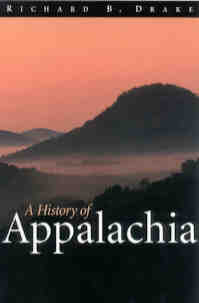A History of Appalachia
 I have a book to recommend - Richard B. Drake's (a professor emeritis of Berea College up in Kentucky and a co-founder of the Appalachian College Association) A History of Appalachia (I mentioned it below , if you 'll remember). The book is, as it posits to be, a history of the region. Let me say the parts that are negative first, get them out of the way so we can move on. One, the book is pretty repetative about certain themes - thus I recommend reading it as a series of essays or collected lectures rather than as a single tour. Also, there is a subtle, but noticable, not so much anti-Wesleyan bias (Wesleyan here refering to all evolvants from Wesleyan theology, from the rationalist Methodists to pentacostals), as much as a "not-a-fan" bias (and a tendency to leave out Methodists from several theology roll-calls, including contributions to education). On the other hand, he's a big, big fan of Calvinism and Presbyterianism. . . which I'm cool with - its nice to get the other side (grin).
I have a book to recommend - Richard B. Drake's (a professor emeritis of Berea College up in Kentucky and a co-founder of the Appalachian College Association) A History of Appalachia (I mentioned it below , if you 'll remember). The book is, as it posits to be, a history of the region. Let me say the parts that are negative first, get them out of the way so we can move on. One, the book is pretty repetative about certain themes - thus I recommend reading it as a series of essays or collected lectures rather than as a single tour. Also, there is a subtle, but noticable, not so much anti-Wesleyan bias (Wesleyan here refering to all evolvants from Wesleyan theology, from the rationalist Methodists to pentacostals), as much as a "not-a-fan" bias (and a tendency to leave out Methodists from several theology roll-calls, including contributions to education). On the other hand, he's a big, big fan of Calvinism and Presbyterianism. . . which I'm cool with - its nice to get the other side (grin).
All that aside, I have few complaints about the book. Heck, let me drop you a quote that I love. . . maybe it'll give you sense of what I mean:
As we examine regional arts, a key charcteristic of the region's artistic mind is that the "lowbrow" folk arts predominate over the "highbrow" fine arts. In urban society the highbrow is clearly given primary status, but in Applachia the lowbrow is seen as less pretentious and is widely respected. And it appears always to have been thus. In fact, many modern scholarly analysts of folk culture insist that the folk artist when he or she creates has in mind remarkably mature contextual insights, though skeptics sometimes are suscpicious of the level of sophisication that folklorists claim to see. But it is certainly true that "democratic" folk arts are remarkably active in the region, and the creations of Appalachian folk artists command a remarkable respect among urban, mainline Americans.
You want to read it now, don't you?
Of course you do.
I won't go into too many details on this one, frankly, because to do so would open a huge can of words - how do you stop writing about the qualities of a book you've dog-earred up till it looks like an origami piece? The one other part I would like to mention explicitly is this: Drake outlines the unique Appalachian attitudes towards race (i.e. our leadership in civil rights in integration) and dealing with calamity (the "Appalachian sense of humor") better than anyone I've read so far.
Put simply, this is a great review of Appalachian history - a solid introduction for the layman who wants to understand, but hasn't had the opportunities to do so.




1 comment:
It is natural and nothing to worry about because generic Generic Viagra has arrived to save men from getting embarrassed in bedroom. Pfizer introduced oral pill Viagra in 1998 and Cialis created uproar, which is contrary to the reaction generally related with a launch of any usual medication.
Post a Comment